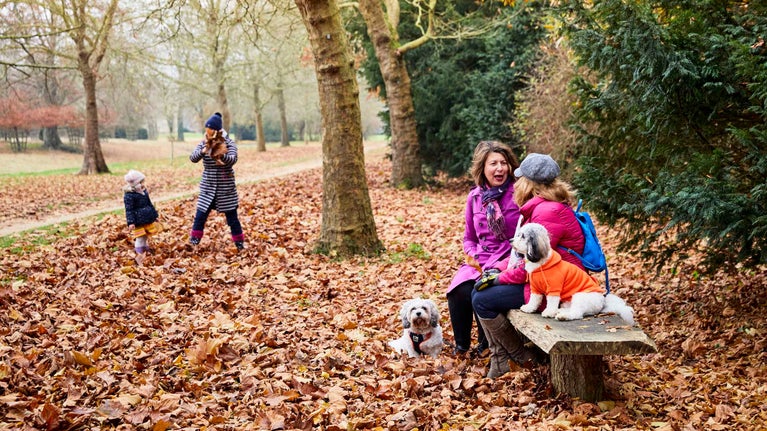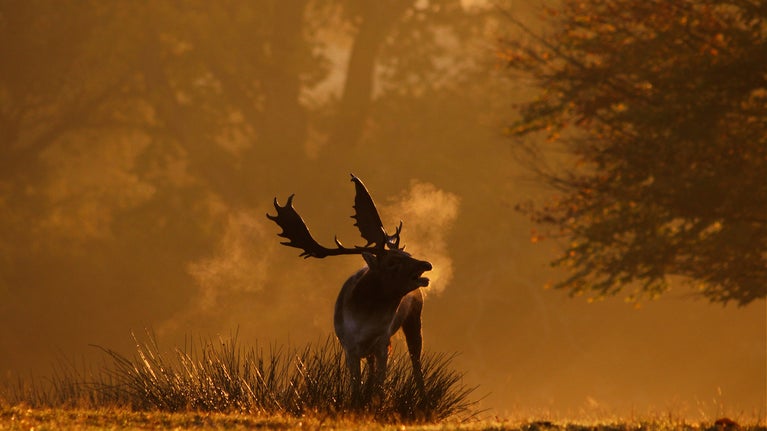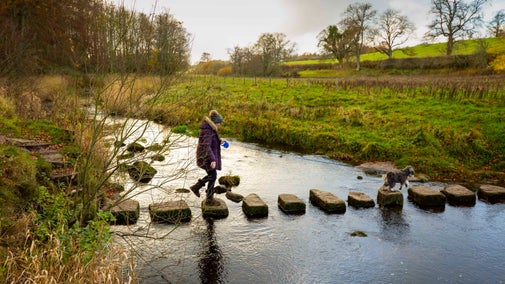
Discover more at Lyme Park
Find out when Lyme Park is open, how to get here, things to see and do and more.

If you are in need of some fresh air this spring, come and explore over 1,400 acres of historic parkland. Head out to the wider estate for walks through woodland and across the moor for far-reaching views. Seek out the built structures dotted through the landscape for some of the best views. There’s plenty of wildlife and nature to see along the way.
Structures were built at strategic spots around the park to draw the eye across the landscape. An iconic view at Lyme, the original Cage was built by the warrior priest, Sir Piers V, in 1524.
It's had many uses over the centuries its name reportedly comes from its use in the 17th century as a holding prison for poachers awaiting trial.
It was rebuilt in the 1730s as part of Giacomo Leoni’s works to the house. Leoni played up its fortress-like appearance but also made it more hospitable, possibly so that it could be used as a banqueting room.
Later still, the Cage became a home for estate workers, though it must have been a hard experience living at the top of this windswept hill.
The Lantern is another Lyme landmark. The top part of the sandstone tower is believed to originally have sat above the north archway of the house and was probably placed on the hill next to the woods in the 1720s. The view from the Lantern looks out over the park and the Cheshire plain.
It also creates a line of sight that leads the eye from the Dining Room windows, over the gardens and to the east. It is said that if Lord Newton could see the Lantern clearly from the Dining Room, it was good enough weather for hunting.
Built from stone quarried on the estate, Paddock Cottage sits high in the south of the park. The interior is plain apart from a decorative heraldic panel, Sir Piers Legh IX's coat of arms. Paddock Cottage’s position, with direct sight line to the Cage, and ornate overmantel implies the building was used for ‘showing off’ to guests – possibly used for dining after the hunt. It was later used as a dwelling for estate workers.

With acres of woodland, moorland and meadows, Lyme is the perfect place to explore on a walk as the colours start to change. Take in glorious views in a quieter area of the park on the Lantern walk, or follow the Paddock Cottage walk to find Knightslow Wood, Pursfield Wood and Drinkwater Meadow. Dogs on leads are welcome and downloadable maps and step-by-step guides are available for each walk.
Join a guided walks to find out what makes Lyme's estate so special. Book a space on free walks throughout the year such as 'Water Divining' or 'Walk the Walls at Lyme', and our knowledgeable volunteers will show you some of the best bits of the estate or buy tickets to discover 'the Dawn Chorus' in Spring and 'the Deer Rut' and 'fantastic fungi' in Autumn.

Deer ruts are best viewed with binoculars from a safe distance. If you're visiting with your dog, please keep them on a short lead around deer and give them plenty of space.
One of nature's seasonal spectacles is the autumn deer rut, when male deer (stags or bucks) lock antlers in competition for female deer (hinds of foes).
Their bellows can be heard resonating across the moors, and if the loudest roar doesn’t decide the dominant male, stags will size each other up with ‘parallel walking’. Equally matched males will occasionally lock antlers, aiming to use their massive strength to physically push the other male out of their territory. The winner of these competitions is rewarded with a harem of females with whom they breed.
At this time, older and younger males often live on the periphery of the herd, hoping to mate with another stag’s females while he is otherwise occupied.
Lyme is home to a number of veteran trees of different species. The oldest oak tree is around 550 years old. They are vital because they support so many animals, insects and fungi – sometimes up to 260 species.
Whether you're in your garden or in the outdoors be tick aware. Ticks are small, spider-like creatures that feed on the blood of animals, including people. They don't fly or jump, rather wait on vegetation for something to pass by.
Avoid ticks by walking on clearly defined paths to avoid brushing against vegetation, wear light-coloured clothes so ticks can be spotted and brushed off, and use repellents such as DEET. It's always good practice to carry out a tick check when you get home.

Find out when Lyme Park is open, how to get here, things to see and do and more.

Lyme is a three pawprint rated place. With 1,400 acres of rugged moorland, ancient woodlands and formal gardens to explore, Lyme is a great day out for you and your dog. Find out where your dog can go and the facilities available below.

Explore all the different areas of the garden at Lyme. This Autumn appreciate the changing colours of the garden with the wild moors and parkland beyond.

Step inside the house and discover unusual objects and strange secrets as you walk through six centuries of family history at Lyme in Cheshire.

From running, skipping and jumping around Crow Wood play area and dressing up in period costume inside the house, to spotting red deer in the park, there’s something for everyone at Lyme.

Plan a visit to one of the special countryside places in our care and discover the benefits of being in the great outdoors. Pack your walking boots and get ready to explore woodlands, valleys and rivers.

Explore some of the finest landscapes in our care on coastal paths, accessible trails, woodland walks and everything in between. Find the best places to walk near you.

From deer parks and grand estates to the rolling countryside and woodland, there is plenty of space for you to stretch your legs amongst autumn colour at National Trust places in Cheshire and Greater Manchester.